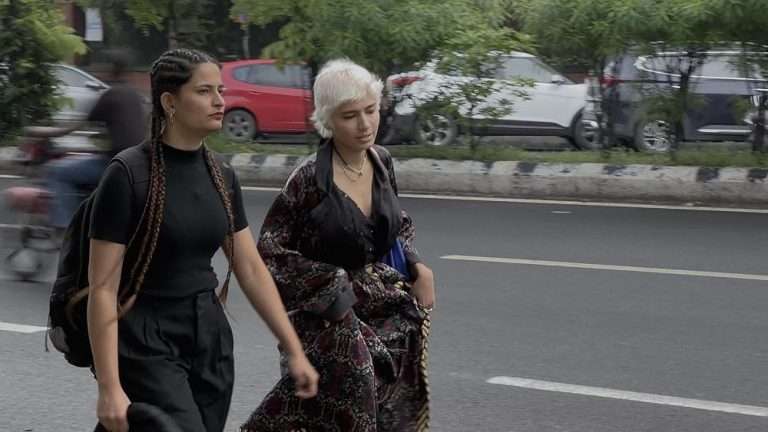Words travel beyond the speed of light whenever something lucrative enters the realm. The day’s hot topic is a milestone for many individuals to reflect the issue back into their own lives, forming the sagacity to overcome what has been left ashore under their memory cycle. Neighbors living in a closeted vicinity often share the same cloudy milieu, where a concrete wall or a wooden door separates each household member to live in their respective space fillers. An exhibition of a cluster of multiple classifications cascades into this cagy, coherent drama by director Siddharth Chauhan in Amar Colony (2023).
The pillar of blossoming is shared among three women of different circumstances and outcomes, who have cultivated the evolution of the pace into inescapable, contradictory projections in Amar Colony, which won the Special Jury Prize at the Tallinn Black Nights Film Festival 2022. Each of them has their own measures and outlines to fulfill, whereby they are all interconnected to form a marvel of commotions.
Meera (The Perspiring Loner) – Meera is, nonetheless, the primary icon of unfulfilled desires written on the screen under her own spell of destruction. The obligation of carrying a child in her world of wobbly decisions and upshots glides her into a passageway of sexual tensions to permit herself to be on par with her inner endurance. Her husband doesn’t seem to be present in her standards of living as he goes missing from his responsibilities as an appropriate companion. She lets out an aura of engagement with her connections around the colony, often for her benefit and sometimes to seek a warm portal to dump her unending, soundless depression.
Director Chauhan fashions the structure of lining the state of a woman in favor of experiencing true love through intimacy, surrounded by rotten privacy and community hazards. His screenplay linking deep conversations to diverse dimensions of depictions, in fact, caters well to absorbing the essence of watching the classification through a refractive lens. Meera exerts to uplift her force of yearning without realizing that her moves have a double-edged sword clipped all over them.
Devki and Mohit (The Rift of the Ages) – There is a staggering divide between the mother and son based on their palpable, coarse tenor whenever they communicate with each other. Devki wears her lecturing outfit, which stays intact with her fortitude to curtail her son’s decisions and opinions, which nurtures a sudden implication of overprotective projection towards Mohit. Devki limits her son’s connective circle and treats him as a hypothetical roommate while also deciding every inch and notion that Mohit has to perform in his everyday life without any long conversations. Mohit, on the other hand, is a time bomb who has been through a lifespan of accepting the slashed verbal abuses poured by Devki over the years, which has made him into a lifeless, zombie-like human.
Devki somehow programs Mohit to be a tedious chore helper, which can be seen in a specific scene where Devki unceasingly commands Mohit to prepare a herbal beverage for Meera while limiting her clemency towards him. The execution of this vital scene stretches a clear output of the rift that has been evoked between them, placing them into the foe’s chamber that crucifies the film to a crossroad. Here, director Chauhan presents the audience with a closeted world of a dysfunctional relationship between two individuals with nothing optimistic to offer each other. One individual struggles to move on from an internal tragedy, while another has to face the downsides within his own territory. A negative sensation often travels in their four-edged concrete wall that has heard the worst of both parties.
Dunga (Lord Hanuman’s Advocate) – Dunga is the religious representative of the colony, placing her entire flow of life upon the teachings of her belief. She is very superstitious and trusts that she is immortal and can combat aging. Her small scaled family comprises her husband, who works in their tailoring shop, and her grandkid Rohan who seems to be an obedient kid in his own world. However, nothing seems to be ordinary in her own garden of life, as everyone in her family has something wrapped in their secret cupboard.
Director Chauhan polishes his direction skills here by showing the concealed secrets of a pious family with more than just prayers to offer. Gunja is in solidarity with her prospective attempt to be the game changer in all her personal affairs through religion, often visualizing herself as carrying the “gada” as her guiding armor. She goes into a trance-like moment to contest the difficulties, which supports her in correcting all the hitches in her daily life. The conveyance of a parallel ideology is set to counteract her beliefs as she fears for the future of Rohan due to her husband’s nature of work and desires. The approach by Chauhan here is almost poetic and mystical, clearing the air in Gunja’s mind that the apple might not fall far from the tree.
The production design led by Avyakta Kapur and cinematography by Modhura Palit captures the true endowing household environment, which rings the bells of the film ‘Labour of Love” by Aditya Vikram Sengupta. The arrangements of the utensils, furniture, and even the imagery of the entire colony from the cinematic angle create a dejected temperament that surfaces the ongoing reflection of the miseries which regularly occur in households.
Everyone hopes to have their tailored freedom from the ties of their circle in the Amar Colony. They yearn for a message of hope and an awakening of a foundation where everyone gasps for personal space to release their ongoing desires that could tap their mind from morality and justified reality. There are dark tunnels hidden in every room of Amar Colony, whereby masks are worn to disguise among the rest. While limiting a repulsive action rumbles the ecosystem slowly like an infective parasite, the detonation of an aged and concentrated patience box would poke the bubble of normality, disrupting the decorum of an entire household or, in this case, the whole colony.

![T2 Trainspotting [2017]: An Acid Trip Down the Memory Lane](https://79468c92.delivery.rocketcdn.me/wp-content/uploads/2017/05/trainspotting-2-empire-cover.jpg)
![Lion [2016] – A Melodrama with Considerable Stretches of Admirable Nuance](https://79468c92.delivery.rocketcdn.me/wp-content/uploads/2017/02/lion-cover-768x512.jpg)

![Pale Flower [1964] Review – A Noirish Parable with Striking Imagery](https://79468c92.delivery.rocketcdn.me/wp-content/uploads/2019/07/Pale-flower-cover-768x432.jpg)

